UAE's Vision and Strategy for AI
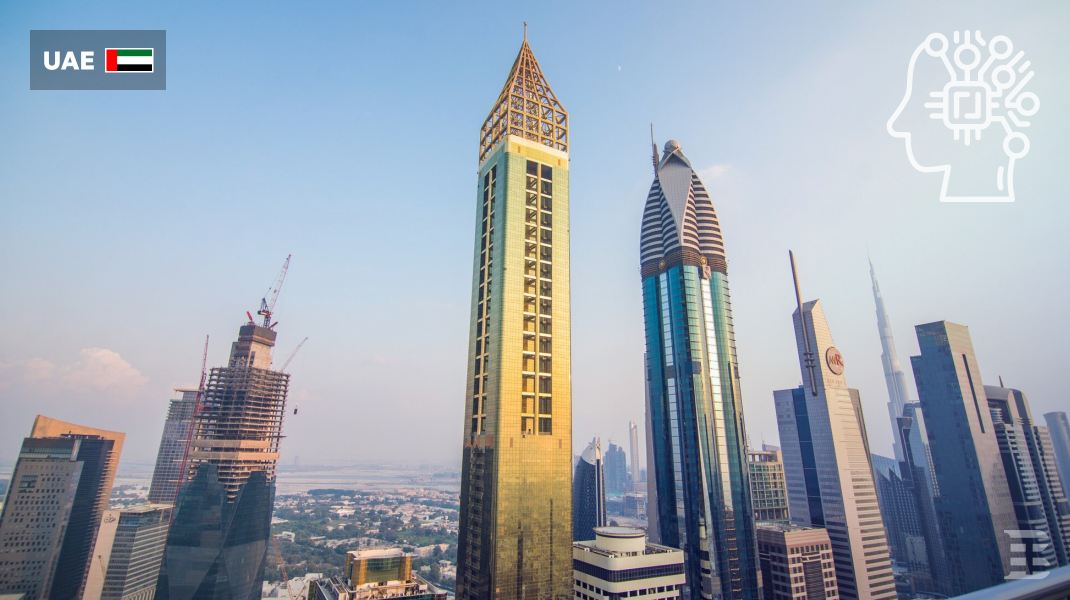
The United Arab Emirates (UAE) has set a bold vision to become a leading nation in Artificial Intelligence (AI) by 2031, in line with the UAE Centennial 2071. This ambitious goal is expected to bring about considerable economic, educational, and social transformations, generating up to $90.45 billion in additional growth. The UAE National Strategy for Artificial Intelligence 2031 report outlines the approach to achieving this goal.
“Today’s biggest tech companies, led by Google and Amazon, want to put AI at the core of their businesses, and the UAE hopes to do the same for an entire nation.”
The UAE will build an AI economy, not wait for one. The National AI Strategy – UAI – from AI ready to AI leader.
The AI Strategy has the following strategic initiatives:
-
Create a reputation as an AI destination
-
Increase the UAE's competitive assets in key sectors by implementing AI
-
Develop a flexible ecosystem for artificial intelligence
-
Implement artificial intelligence across customer services to improve lives and government activity
-
Attract and train talent for future jobs enabled by AI
-
Bring world-leading research capability to work with target industries
-
Ensure strong governance and effective regulation
Where the UAE has opportunities to lead
Industry Assets & Emerging Sectors
We will transform the UAE into a world leader in AI by investing in people and industries that are key to our success.
Artificial intelligence is expected to make the largest contribution to the economy of the United Arab Emirates (UAE) in the financial services sector, with approximately $37 billion by 2035.
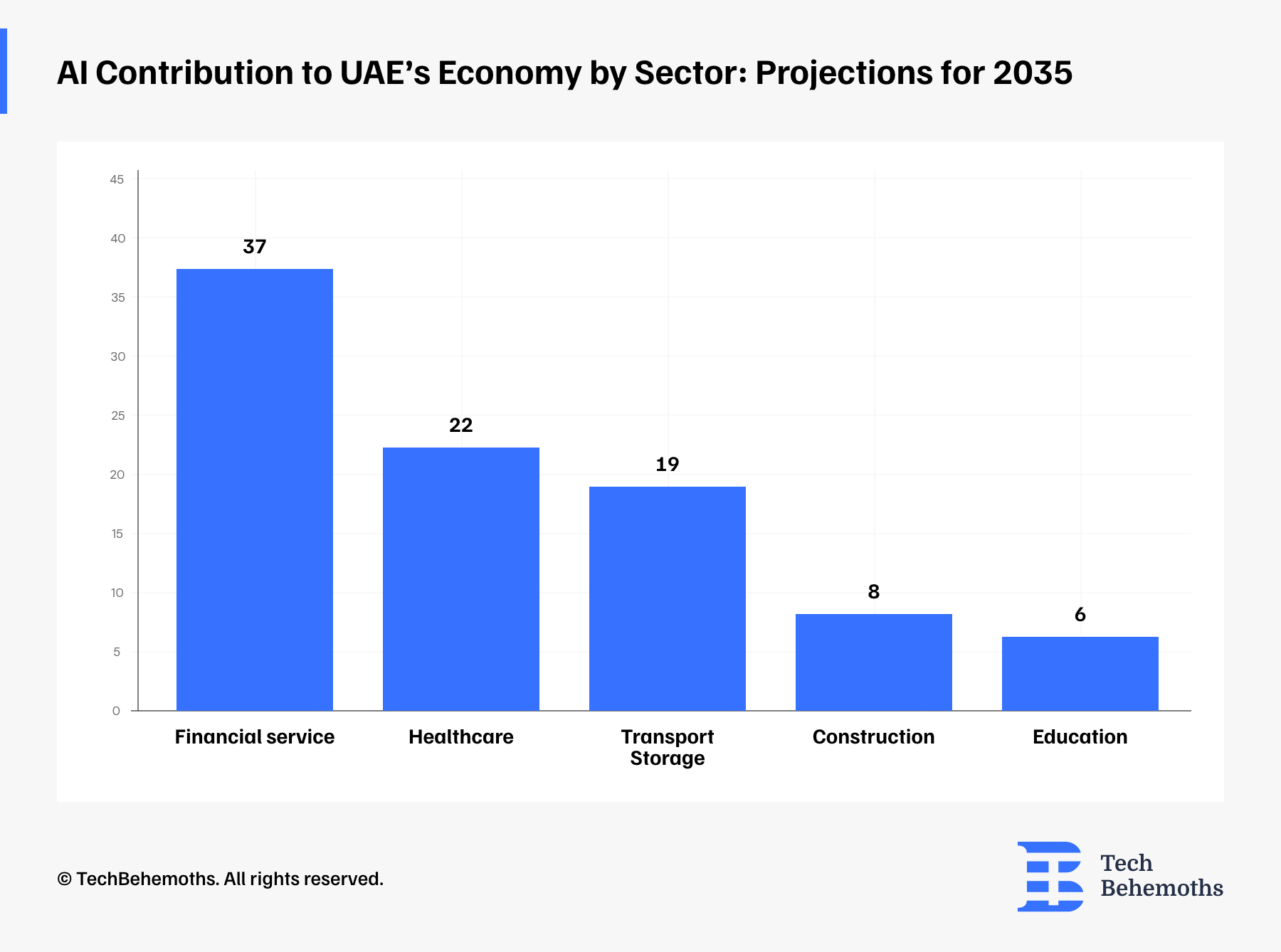
Also, the UAE has identified priority sectors for AI deployment, including resources and energy, logistics and transport, tourism and hospitality, healthcare, construction, education, and cybersecurity. These sectors were chosen due to their potential economic gains and opportunities to lead globally.
Smart Government
The UAE public sector is already a leader in smart public service delivery:
“We initiated electronic services 16 years ago, and today we are launching a fresh stage relying on Artificial Intelligence… we are seeking to adopt all tools and methodologies related to Artificial Intelligence to expedite and ensure more efficiency for government services at all levels.” His Highness Sheikh Mohammed bin Rashid Al Maktoum UAE Vice President, Prime Minister and Ruler of Dubai.
The UAE is utilizing AI in various innovative ways across the government such as dynamic adjustment of transport timetables, smart traffic using AI sensors, facial recognition to monitor driver fatigue, and chatbots for customer service. The government is determined to increase the experimentation with AI to improve the lives of citizens.
New Generation Of Regional Talent
The Middle East and North Africa have a growing professional workforce, with a high proportion of professionals in operations, IT, and engineering. The UAE offers access to world-leading universities and a safe hub for highly skilled professionals to re-skill in in-demand AI roles.
Out of the job functions reported on LinkedIn profiles, operations, information technology, and engineering are ranked 1, 4, and 6, respectively. A subset of these employees are already combining technical skills with business operations, with 21% of skills associated with business intelligence software, 20% with data operations experience, and 8% with Machine Learning & Statistical Modelling tools.
Share of national graduates that are in AI-relevant specializations (statistics, mathematics, ICT technologies and engineering) for selected countries.
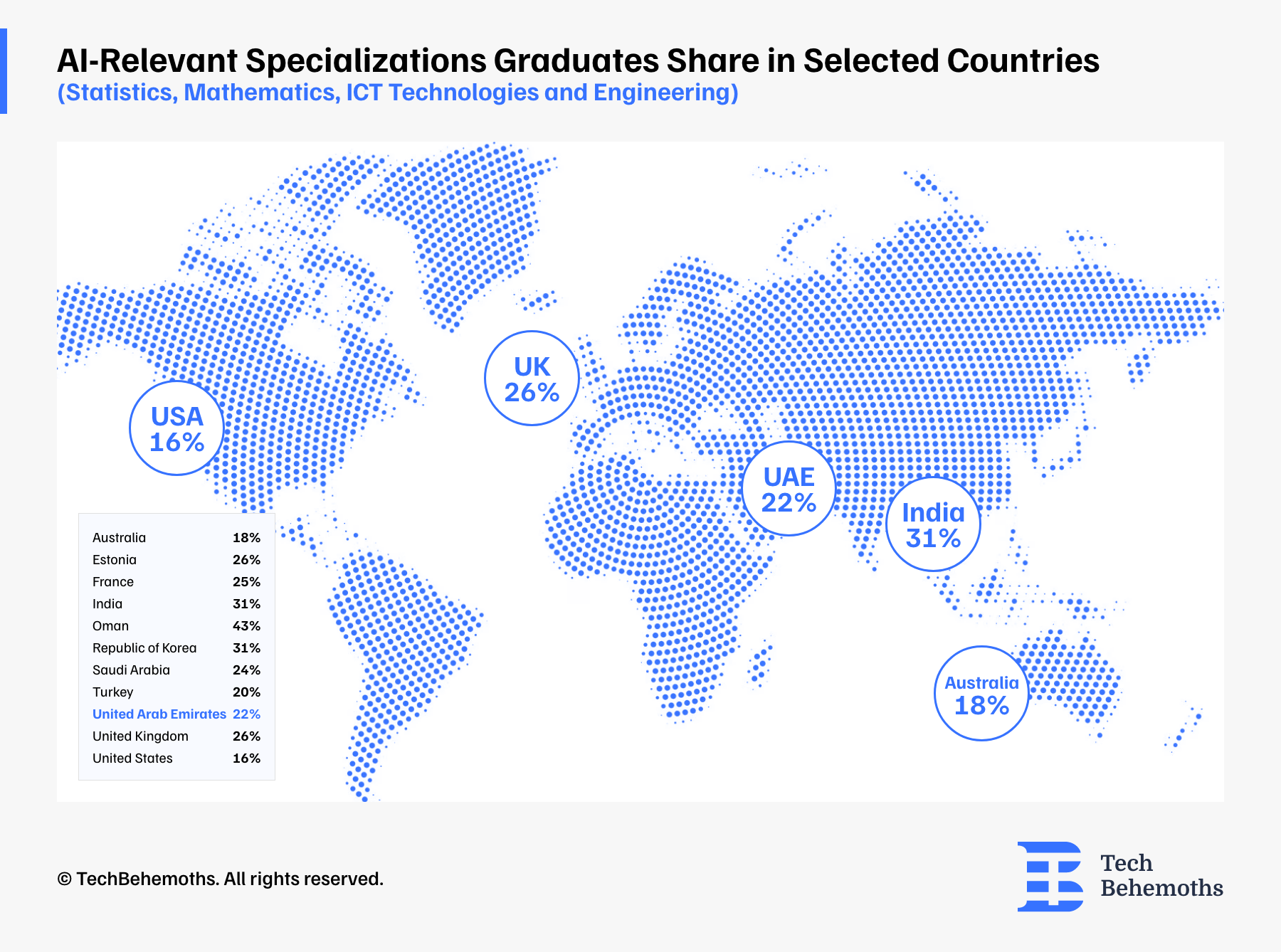
UAE’s Strategic Goals for AI
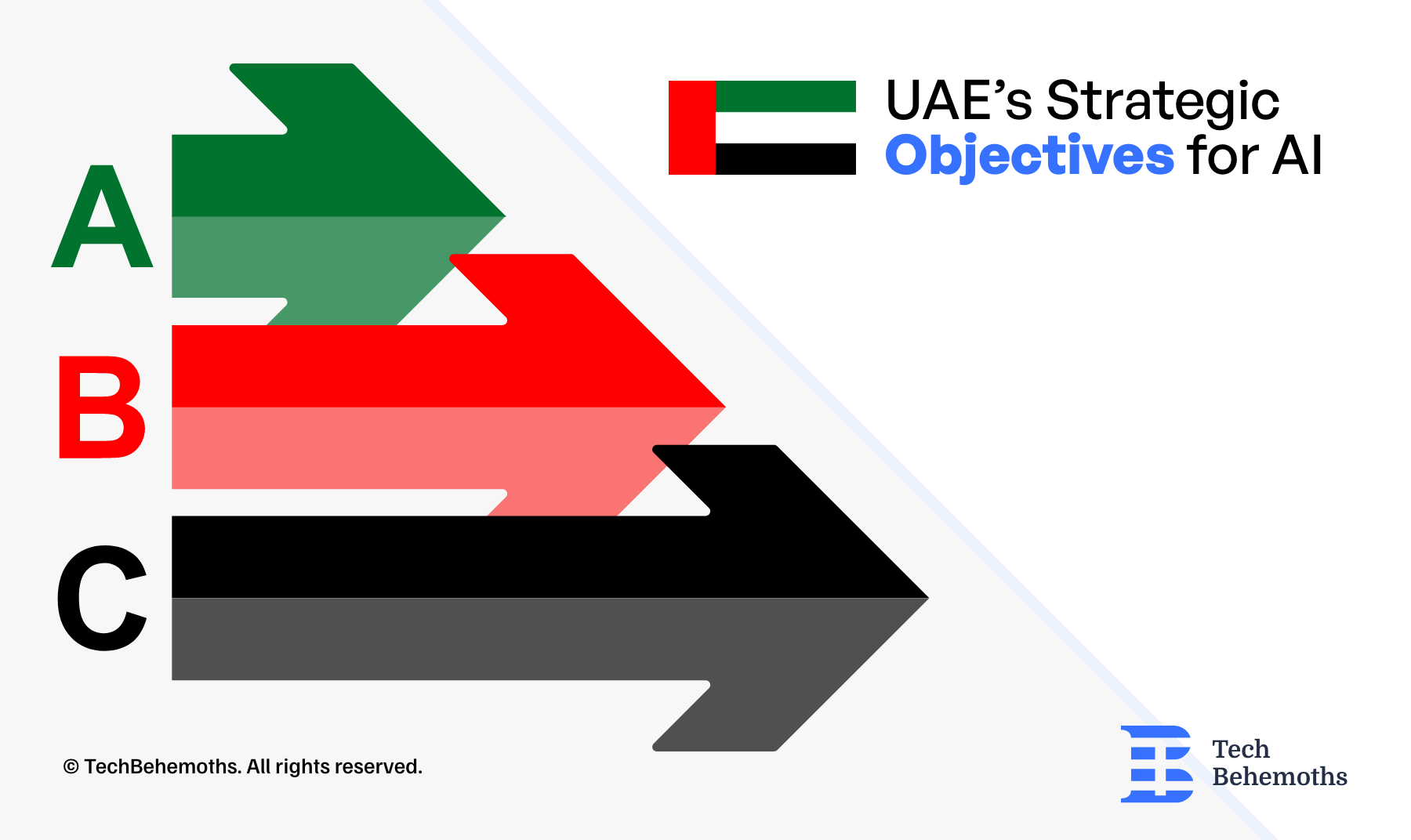
Goal 1: Create a reputation as an AI destination
The UAE is developing the UAE AI Seal brand (UAI) to attract talent and businesses from across the globe to come to the UAE to test and develop AI. This includes a UAI mark recognizing high-quality, ethical AI companies. It would reward safe, efficient, verified AI technology with a ’UAI Seal of Approval’.
The UAE AI Seal brand is currently under development by the AI Office. The brand will be approved at the Public, Private, Institutional, and Product Levels.
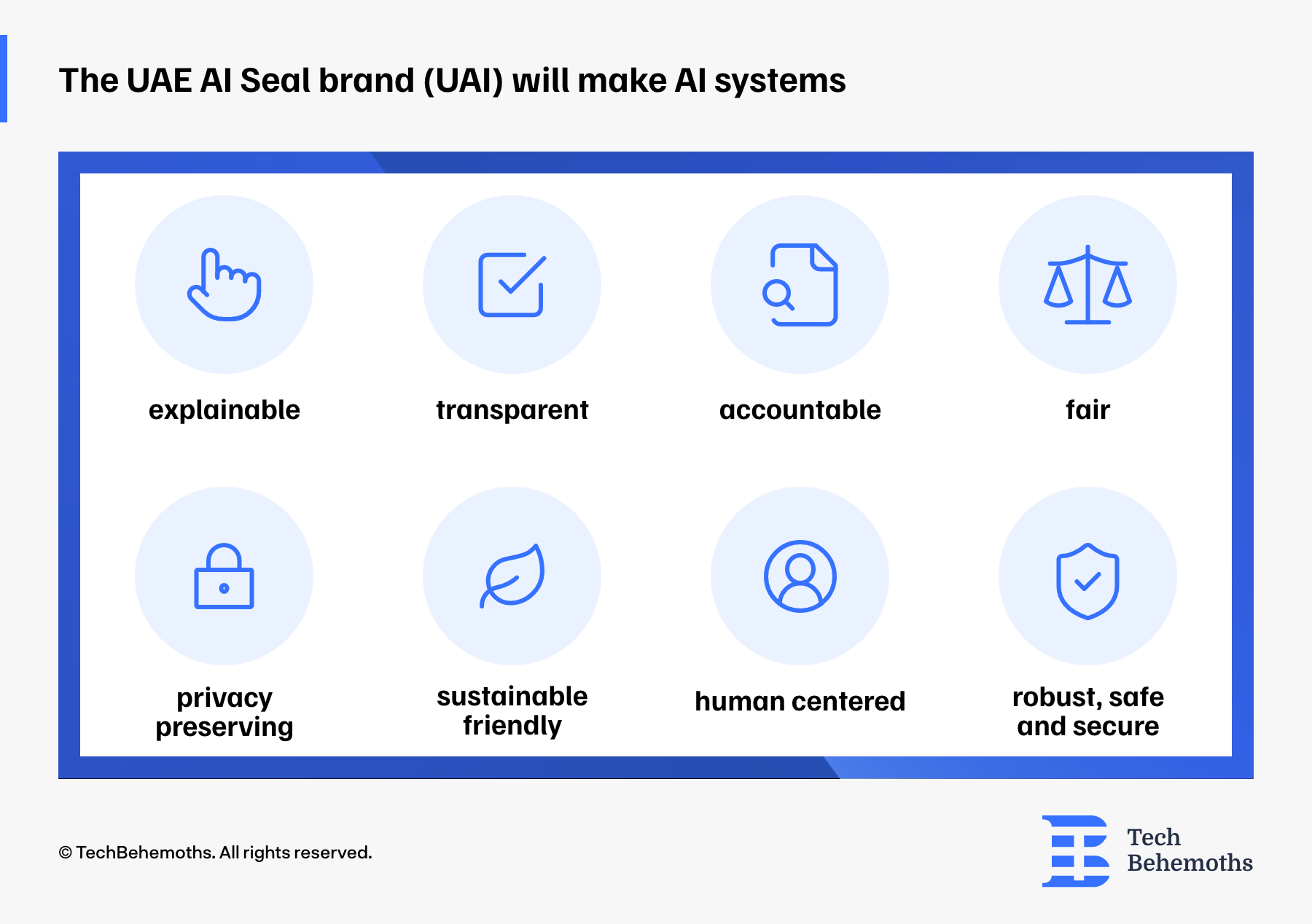
Goal 2: Increase the UAE's competitive assets in key sectors by implementing AI
Existing Assets
Resources & Energy:
-
The United Arab Emirates (UAE) is among the world's 10 largest oil producers and can leverage AI systems for energy sector innovation.
-
AI systems can support renewable energy supplies and efficient water desalination.
-
UAE plans to use AI systems for internal energy-saving decisions and global understanding of oil supply and demand.
Logistics & Transport:
-
Dubai Airport and Abu Dhabi Airport are popular transit hubs in the UAE, with over 60 million and 26 million passengers passing through respectively. AI solutions are being explored to help with air traffic management, baggage handling, and boarding.
-
The UAE also plans to fund logistics and transport projects utilising its physical and digital assets.
Tourism & Hospitality:
-
There is a big chance to combine services that draw tourists with packages that are provided to them. AI can anticipate visitor demands and offer personalized services.
Goal 3: Develop a flexible ecosystem for artificial intelligence
To develop a domestic AI ecosystem in the UAE, funding, knowledge, and strategic support are needed. Access to local data infrastructure and funding for projects will create opportunities for new companies. Incentives for developing world-leading products and services are also needed. AI systems require coordination across multiple locations and industries, and governments can provide networks, data, and finance to overcome barriers.
AI Network
The UAE would accelerate research, collaboration, and commercialization of AI by establishing a network of researchers, industry experts, and policy experts. The Mohammed bin Rashid Innovation Fund has $54 billion to support local innovators, while collaboration with the UAE Artificial Intelligence and Blockchain Council could help companies access government data.
The Artificial Intelligence Incentive Scheme for Foreign Companies
Foreign direct investment (FDI) is expected to support industry development in the UAE, bringing technology and skills to the country. 70% of global executives believe technological change will increase global FDI. However, the UAE is not a top destination for FDI investment.
To facilitate greater FDI plans to make changes to foreign investment laws and improve business reputation. This will also motivate international companies to establish regional offices or relocate to the UAE. Although the UAE lacks a strong AI talent hub, it is building attractors to grow the technical community.
Business Support for UAE AI Companies
After establishing a local presence, the UAE intends to expand globally. This requires investments, such as marketing campaigns and joint ventures, which can be challenging for individual businesses. Governments can facilitate this process by offering guidance, and financial support, and acting as coordinators, helping businesses overcome knowledge barriers and connect with international markets, leading to increased exports and growth.
Goal 4: Implement artificial intelligence across customer services to improve lives and government activity
National AI Challenges
A national program could be launched to address UAE's challenges with AI. The program would provide funding, mentoring, and data access to the best ideas from the government, universities, and the private sector. The project's objective is to demonstrate the benefits of AI to the UAE population and inspire the nation to embrace AI for better lives. This initiative could help the UAE become the healthiest and contribute to the country's overall development.
UAE Artificial Intelligence and Blockchain Council
The UAE is exploring the use of AI to enhance the efficiency and cost of government transactions and services, to reduce administrative time, and errors. The UAE Artificial Intelligence and Blockchain Council, consisting of representatives from all emirates, will identify the best ways to incorporate AI in government and the necessary infrastructure.
The council's main objective is to move key services like tax filings, applications, regulatory compliance checks, and fine payment payments to cross-platform digital platforms with high-quality, complete, and accessible data.
Goal 5: Attract and train talent for future jobs enabled by AI
A 2018 World Government Summit study found that in six Middle Eastern countries, 45% of labour market activities are currently automatable, slightly below the global average of 50%. This percentage is higher in routine tasks like manufacturing and transportation, while in arts, education, and healthcare, where human interaction and creativity are more important, the percentage is lower.
The UAE has the potential to automate 43% of existing work activities across key sectors, including administration, government, manufacturing, and construction. Retraining of government workers is critical, as around 70% of Emiratis are employed in the public sector.
Automation may impact almost 300,000 jobs in the UAE's Administrative Support and Government sector, with around 125,000 of these jobs held by UAE nationals. This will have an impact on the public sector workforce and needs to be carefully managed.
The UAE's working practices differ from US job descriptions, and the growing youth population and job-related visa dominance could impact workforce dynamics. The low-skilled population, with 40% having good digital skills, is less prepared for automation than the UK's 56%.
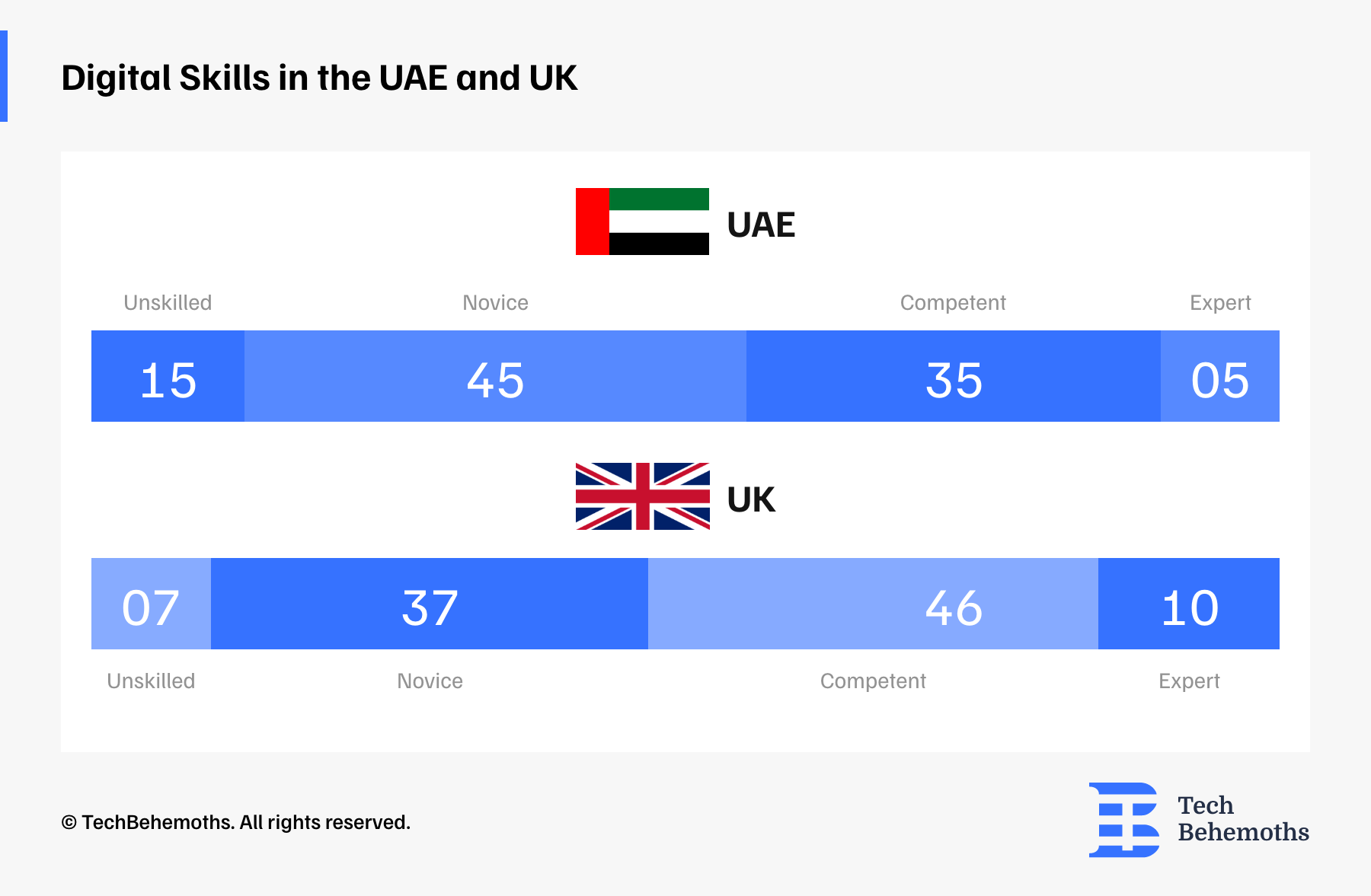
Developing better digital skills and understanding AI will help the population make better decisions in an economy where automation technologies enter the workplace.
Public AI Training
The UAE AI Summer Camp, held in 2018, offered free courses to UAE residents to improve their understanding of AI technologies. Over 5000 residents received specialized training on AI fundamentals, that will build a generation capable of adopting advanced technologies and developing solutions for future challenges.
Upskilling Students
The UAE's small student population, with 22% in core STEM areas, presents an opportunity for AI experts. Upskilling STEM graduates with specialist courses can increase the number of AI experts and strengthen the UAE talent pool for post-graduate training. The UAE will produce world-class AI talent by upskilling 1/3 of its STEM graduates annually, with 2000 students.
The Minister of State for Artificial Intelligence announced this at the February 2018 World Government Summit. The AI Office has also started specific training for government employees, as the public sector is a major employer and potential AI user in the UAE.
Employment Transition Support
The AI Office is supporting the Minister of State for Higher Education and Advanced Skills in improving data collection for skills training for 60% of the workforce with low digital skills. They are also advocating for the development of career advice tools and services to help current and future workers make informed choices.
Goal 6: Bring world-leading research capability to work with target industries
The UAE will increase knowledge production in universities and commercial R&D by increasing research investment and attracting world-class academics. The first step is to invest in AI R&D capability, as the US, France, the UK, and China have embraced strategic national plans to increase AI's share of R&D investments.
The UAE ranks 35th globally for overall R&D investments, and the focus will be on supporting and expanding the research of this small community to provide a targeted boost to AI R&D.
Moreover, the state needs to attract more research talent to build capacity and share AI knowledge. It can look for short-term opportunities for leading AI professors to work and experience the potential in the UAE to attract them in the longer term. Saudi Arabia's partnership with MIT has created a flow of expert academics to Saudi Arabia.
Population Percentage: Full-time Researchers in Science, Technology, and Innovation.
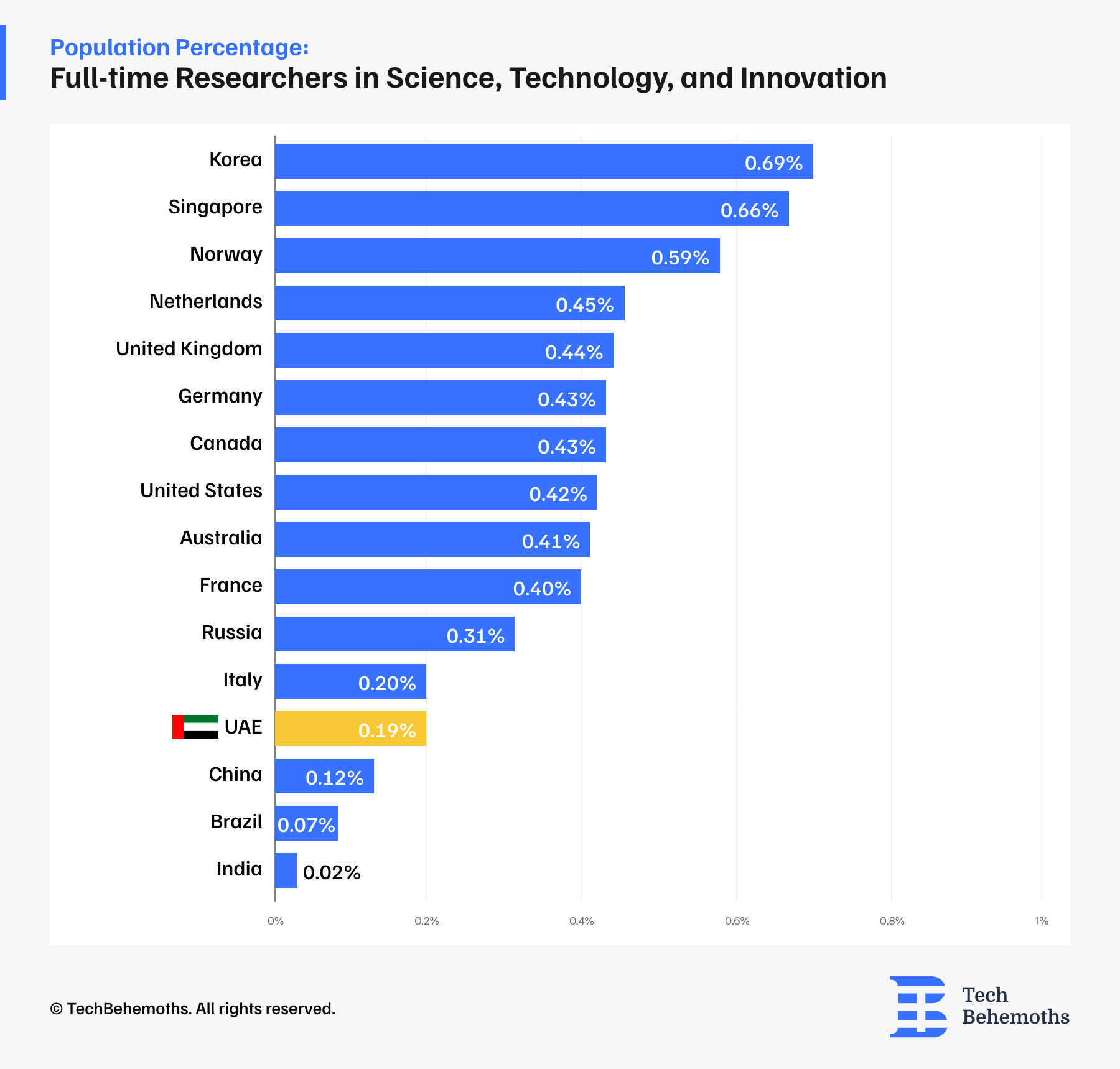
-
National Virtual AI Institute: The UAE is focusing on targeted investment in AI R&D by surveying local capacity and launching a National Virtual AI Institute to accelerate R&D applicable to the industry.
-
Key Thinkers Program: They plan to attract key AI thinkers through workshops and research projects with local entities, aiming to improve lives and ensure good governance of AI.
-
AI Library: To bridge the research gap by creating an open-access digital library of AI research in English and Arabic, promoting collaboration between academia, industry, and government.
Goal 7: Ensure strong governance and effective regulation
Intergovernmental Panel on Artificial Intelligence
In March 2018, President Macron announced a desire to establish an "IPCC for Artificial Intelligence", and the UAE has expressed a desire to work with France and other governments in creating the foundations for such a body. The AI Office is actively working toward making this happen.
Conclusion
The UAE is determined to give its diverse population the best opportunities to flourish and become the best. The AI National Strategy is an important component of the UAE Centennial 2071 that will transform the country by 2031 and set the foundation for future generations.
The Minister of State for Artificial Intelligence will contribute to the responsible development of AI to reach the UAE's goals and inspire other nations to leverage technology for the well-being of humanity.